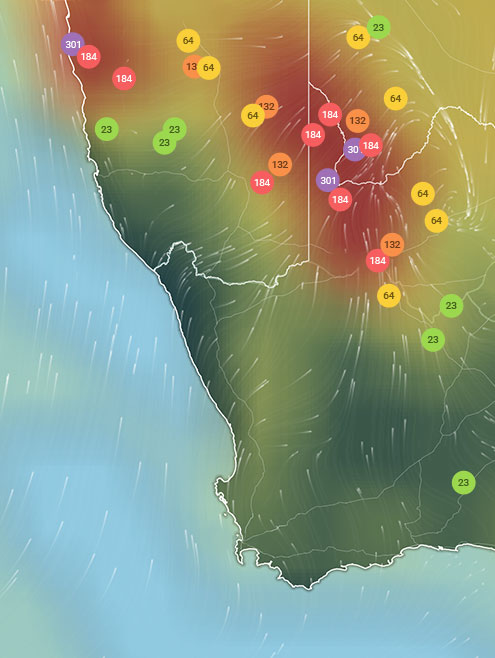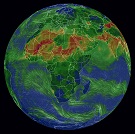Get a monitor and contributor to air quality data in your city.
1.4K people follow this city






AIR QUALITY DATA CONTRIBUTORS
Find out more about contributors and data sources| Weather | Scattered clouds |
| Temperature | 73.4°F |
| Humidity | 42% |
| Wind | 5.2 mp/h |
| Pressure | 29.7 Hg |
| # | city | US AQI |
|---|---|---|
| 1 | Kayseri, Kayseri | 119 |
| 2 | Manisa, Manisa | 114 |
| 3 | Kahramanmaras, Kahramanmaras | 102 |
| 4 | Sultangazi, Istanbul | 92 |
| 5 | Karabuk, Karabuk | 91 |
| 6 | Bursa, Bursa | 80 |
| 7 | Corum, Corum | 80 |
| 8 | Cankaya, Ankara | 78 |
| 9 | Sivas, Sivas | 75 |
| 10 | Izmit, Kocaeli | 73 |
(local time)
SEE WORLD AQI RANKING
| # | station | US AQI |
|---|---|---|
| 1 | Beyazit Cad.-MTHM | 95 |
| 2 | Kultur Park-MTHM | 83 |
| 3 | Çamlık Sokak - Bursa | 80 |
| 4 | Uludag univ.-MTHM | 77 |
| 5 | Nilufer Kent Konseyi | 61 |
(local time)
SEE WORLD AQI RANKINGUS AQI
80
live AQI index
Moderate
| Air pollution level | Air quality index | Main pollutant |
|---|---|---|
| Moderate | 80 US AQI | PM2.5 |
| Pollutants | Concentration | |
|---|---|---|
| PM2.5 | 26.1µg/m³ | |
| PM10 | 22.6µg/m³ | |
| O3 | 28.7µg/m³ | |
| NO2 | 31.2µg/m³ | |
| SO2 | 17.3µg/m³ | |
| CO | 0µg/m³ | |
PM2.5
x5.2
PM2.5 concentration in Bursa is currently 5.2 times the WHO annual air quality guideline value
| Sensitive groups should reduce outdoor exercise | |
| Close your windows to avoid dirty outdoor air GET A MONITOR | |
| Sensitive groups should wear a mask outdoors GET A MASK | |
| Sensitive groups should run an air purifier GET AN AIR PURIFIER |
| Day | Pollution level | Weather | Temperature | Wind |
|---|---|---|---|---|
| Sunday, Apr 21 | Good 36 AQI US | 69.8° 44.6° | ||
| Monday, Apr 22 | Good 47 AQI US | 69.8° 53.6° | ||
| Tuesday, Apr 23 | Moderate 69 AQI US | 78.8° 57.2° | ||
| Today | Moderate 80 AQI US | 80.6° 64.4° | ||
| Thursday, Apr 25 | Moderate 69 AQI US | 80.6° 59° | ||
| Friday, Apr 26 | Moderate 55 AQI US | 68° 53.6° | ||
| Saturday, Apr 27 | Moderate 52 AQI US | 71.6° 51.8° | ||
| Sunday, Apr 28 | Moderate 56 AQI US | 64.4° 48.2° | ||
| Monday, Apr 29 | Moderate 56 AQI US | 71.6° 51.8° | ||
| Tuesday, Apr 30 | Moderate 57 AQI US | 69.8° 55.4° |
Interested in hourly forecast? Get the app
Bursa is a city in north-western Turkey and the administrative centre of Bursa Province. Bursa is one of the industrial centres of the country and most of Turkey's automotive production takes place here. In 2020 Bursa had an estimated population of approximately 3.1 million people. This makes it the fourth most populous city in all of Turkey.
Towards the middle of 2021, Bursa was going through a period of “Moderate” air quality with a US AQI reading of 88. This United States Air Quality Index number is an internationally used set of metrics supported by the World Health Organisation (WHO) and is used to compare air quality in different cities throughout the world using comparable standards. It is calculated by using the levels of six of the most commonly found pollutants. If not all figures are available, the level is calculated using what information there is. To calculate the level of air pollution in Bursa, there were five pollutants recorded which were: PM2.5 - 29.7 µg/m³, PM10 - 48.3 µg/m³, ozone (O3) - 10.3 µg/m³, nitrogen dioxide (NO2) - 29.9 µg/m³ and sulphur dioxide (SO2) - 14 µg/m³. These figures are quoted in micrograms/microns per cubic metre. It can be seen that the PM2.5 level is almost three times that of the suggested 10 µg/m³ as suggested by the World Health Organisation (WHO).
With a level as poor as this, the advice is to stay indoors as much as possible and to close doors and windows to prevent the ingress of more polluted air. Those of a sensitive disposition should avoid venturing outside until the quality improves. Outdoor exercise is not recommended for anyone at this level and the use of an air purifier would be very beneficial if one is available.
Air quality can be very volatile as it is easily affected by many variables, therefore it can quickly change depending on local conditions and seasons.
Looking back at the figures published by the Swiss air monitoring company IQAir.com for 2020 it can be seen that from February until the end of November, Bursa enjoyed “Moderate” air quality with figures between 12.1 and 35.4 µg/m³. The remaining two months of December and January saw a decline in quality to the “Unhealthy for sensitive groups” category with figures of 36.4 and 38.2 µg/m³, respectively.
Records were first kept in 2018 when the annual average figure was 28.4 µg/m³, falling to 26.3 µg/m³ in 2019. 2020 saw another decline when the figure was quoted as being 25 µg/m³. This may not be an accurate reading because of the restrictions imposed due to the COVID-19 pandemic. Many vehicles were no longer used as the drivers were furloughed and not required to commute to and from work. There were also many factories and other non-essential production units which were temporarily closed in an attempt to prevent the spread of the virus.
The proximity of industrial zones to residential areas, exhaust emission measurements, the high price of natural gas leads citizens to turn to all kinds of fuel, including poor quality coal and even plastic. The lack of coal inspections at the entrances and exits of the city; distribution of free poor quality coal to the needy by the state; the increase in the number of vehicles in road transport and the traffic of vehicles without periodic maintenance are among the causes of air pollution.
PM10 pollution has been a very serious problem in Bursa, especially in recent years. Although the national limit value of PM10 can be exceeded at most 35 days a year according to legal regulations, it is exceeded hundreds of times per year in Bursa.
Instead of coal aid given to low-income citizens, natural gas aid should be provided in return for this price in order to minimize air pollution.
While only sulphur dioxide (SO2) and PM10 are measured in all provinces in the country, the number of provinces and stations where other classical air pollutants are measured is limited. The government should take immediate action to prevent air pollution and legislate to ensure that the WHO-recommended limit values for air pollutants are adhered to.
Among the measures to be taken against air pollution, it is necessary to insulate the houses, ensure energy efficiency, expand public transportation, especially the rail system, and reduce private vehicle traffic. Boiler rooms of industrial establishments and houses with the central system must be inspected to ensure complete combustion conditions, and boiler operators must be trained and certified. Especially visible polluting chimneys, instant flue gas analysis; Vehicles that create visible pollution should also be continuously inspected by making mobile exhaust emission measurements.
Walking, cycling, electric buses, trams and motorcycles are among the most climate-friendly means of transportation. Electric public transport is followed by buses and trains. A person who goes to work by electric bus emits 25 grams of carbon dioxide per kilometre, while a person driving a car causes about eight times that amount.
Air pollution makes you sick. Vehicle emissions not only trigger asthma and upper respiratory tract problems, but also cause important health problems such as chronic bronchitis and heart attack. The air quality in the cities we live in affects our health and our future.
The World Health Organisation (WHO) and the International Agency for Research on Cancer (IARC) announced that air pollution causes lung cancer and increases the risk of bladder cancer. Particulate matter (PM) is defined as particles with aerodynamic diameters less than 10 microns, consisting of a mixture of solid and liquid particles suspended in the air.
Particulate matter is one of the most important pollutants affecting cities in developed and developing countries. It causes a wide variety of health problems, especially to the heart, lung and respiratory systems. In short-term exposure it causes an increase in hospital admissions from the heart and respiratory system, an increase in asthma attacks, high death rates and lost work days. In long-term exposure it causes deaths due to cerebrovascular, heart and respiratory diseases, an increase in lung cancer, an increase in the incidence of asthma and bronchitis in children, and an increase in the incidence of COPD in adults. It also causes premature birth, type II diabetes and high blood pressure.
2Contributors
Government Contributor
4 stations
Non-profit organization Contributor

1 station
2 Data sources